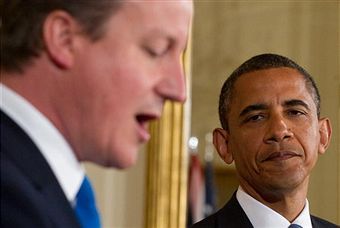 In a post over at the Staggers, defence and security expert Matt Cavanagh has compared and contrasted Barack Obama’s review of US counter-terrorism policy and the
coalition’s recent update of the Prevent strategy, together with David Cameron’s professed ‘muscular liberalism’. Here are his insights:
In a post over at the Staggers, defence and security expert Matt Cavanagh has compared and contrasted Barack Obama’s review of US counter-terrorism policy and the
coalition’s recent update of the Prevent strategy, together with David Cameron’s professed ‘muscular liberalism’. Here are his insights:
The lack of definition across British policy is clear. For instance, the Foreign Office was caught on the hop by the Arab Spring and, four months into the Libyan adventure, officials still have no plan for a post-Gaddafi Libya; indeed, they pray for his continued survival at the moment. The creation of a National Security Council and the numerous reviews undertaken by this government were supposed to shake Whitehall from its indifference; they seem to have been ineffective so far.‘The new (American) strategy contains a fairly detailed discussion of the Arab Spring, arguing for applying “targeted force on Al Qaida at a time when its ideology is under extreme pressure” from events in North Africa and the Middle East. By contrast, Britain’s revised Prevent strategy published three weeks ago, mentions these events only once – in a footnote, saying with characteristic bureaucratic obtuseness that it’s too early to say what the effects will be. The British system has probably been too busy thrashing around on the argumentwhich has divided our politicians, counter-terrorist officials and experts over the last year – the argument about whether the real enemy is terrorism, violent extremism, or extremism more widely. That question was supposedly resolved in the Prevent strategy, which committed the Government to broadening out its counter-terrorist efforts to include non-violent extremists, defined as people and organisations who disagree with our “core values”, including democracy, equality before the law, and universal human rights. David Cameron had flagged this shift in his Munich speech, when he explicitly criticised the previous government tfor focusing too narrowly on terrorism and violent extremism, and failing to be sufficiently ‘muscular’ in standing up for our values. The most interesting thing about the new US strategy from a British perspective is that it essentially takes the diametrically opposite path. President Obama’s foreword asserts that “we must define who we are fighting with precision and clarity”, and the strategy states that “by ensuring that counter-terrorist policies and tools are narrowly tailored, and applied to achieve specific, concrete security gains, the US will optimise its security and protect the liberties of its citizens.” At the time the Prevent strategy was published I criticised it for being sloppily written and not properly thought through – as well as representing a fundamental wrong turn. It fails to make clear whether the Government believes in tackling non-violent extremism as a matter of principle, or because it thinks this will reduce the risk of terrorism.’
But, to my mind, ill-definition is not the only impediment to British policy. Even when there is a clear plan, there is a reluctance to execute it. Organisations that might have been outlawed under Prevent endure: Hizb ut-Tahrir is a case in point. There is little point in promising to be muscular but being pusillanimous, especially where a nation’s defining values and its security are concerned.






Comments